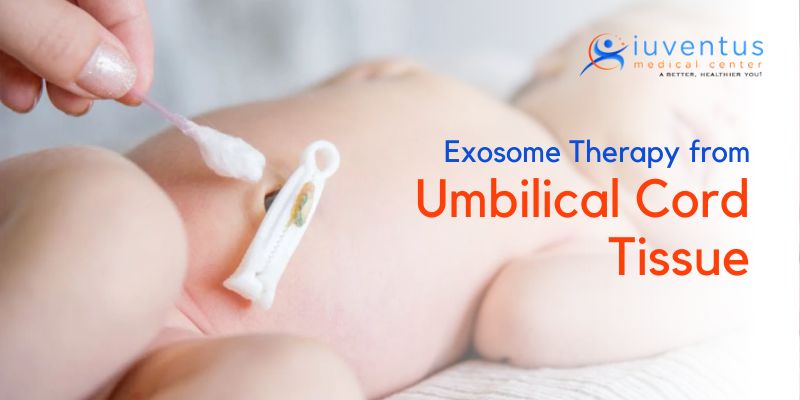Benefits of Exosome Therapy from Umbilical Cord Tissue: Healing Potential for Various Medical Conditions

Exosome therapy derived from umbilical cord tissue has emerged as a promising treatment modality with wide-ranging benefits across various medical conditions. Exosomes, small vesicles secreted by cells, contain bioactive molecules such as proteins, lipids, and nucleic acids that play crucial roles in cell-to-cell communication and tissue regeneration. Harnessing the therapeutic potential of exosomes from umbilical cord tissue offers several advantages, making it a compelling option for addressing diverse health concerns.
Benefits of Exosome Therapy from Umbilical Cord Tissue
1. Regenerative Potential
One of the primary benefits of exosome therapy from umbilical cord tissue is its regenerative potential. Exosomes are rich in growth factors and cytokines that promote tissue repair and regeneration by stimulating cell proliferation and migration. This regenerative capacity holds tremendous promise for treating injuries and degenerative diseases affecting various organs and tissues, including the nervous system, musculoskeletal system, and cardiovascular system.
Studies have shown that exosomes derived from umbilical cord tissue can enhance tissue regeneration in conditions such as spinal cord injury, osteoarthritis, and myocardial infarction. By delivering bioactive molecules directly to damaged tissues, exosome therapy accelerates the healing process, reduces inflammation, and improves overall tissue function. Furthermore, exosomes can modulate immune responses, promoting a favorable environment for regeneration while minimizing immune-mediated tissue damage, making them an attractive option for regenerative medicine approaches.
2. Anti-inflammatory Effects

Another significant benefit of exosome therapy from umbilical cord tissue is its potent anti-inflammatory effects. Chronic inflammation is a common underlying factor in many diseases, contributing to tissue damage and dysfunction. Exosomes contain anti-inflammatory cytokines and microRNAs that help regulate the immune response and suppress excessive inflammation, thereby mitigating tissue injury and promoting healing.
Research has demonstrated the efficacy of exosome therapy in alleviating inflammation in conditions such as rheumatoid arthritis, inflammatory bowel disease, and neurodegenerative disorders. By targeting inflammatory pathways and promoting tissue homeostasis, exosomes derived from umbilical cord tissue offer a novel approach to managing chronic inflammatory conditions. Moreover, their ability to modulate immune cell activity without compromising overall immune function makes them a safe and promising therapeutic option for combating inflammation-associated diseases.
3. Neuroprotective Effects
Exosome therapy derived from umbilical cord tissue also exhibits neuroprotective effects, making it a promising intervention for neurological disorders and injuries. Exosomes contain a variety of neurotrophic factors and microRNAs that support neuronal survival, promote neurite outgrowth, and enhance synaptic plasticity. These bioactive molecules have the potential to modulate neuroinflammatory responses, protect neurons from oxidative stress, and facilitate neural repair and regeneration.
Studies have demonstrated the therapeutic efficacy of exosome therapy in various neurological conditions, including traumatic brain injury, stroke, Alzheimer’s disease, and Parkinson’s disease. By delivering neuroprotective factors directly to the injured or degenerating brain tissue, exosomes derived from umbilical cord tissue can attenuate neuronal damage, improve cognitive function, and enhance overall neurological recovery. Furthermore, their ability to cross the blood-brain barrier and exert therapeutic effects in the central nervous system underscores their potential as a novel approach for neuroregeneration and neuroprotection.
4. Immunomodulatory Properties
In addition to their regenerative and anti-inflammatory effects, exosomes from umbilical cord tissue possess immunomodulatory properties that make them valuable therapeutic agents for immune-related disorders and conditions. Exosomes contain immunomodulatory factors such as TGF-β, IL-10, and HLA-G, which regulate immune cell function and promote immune tolerance. By modulating the activity of T cells, B cells, dendritic cells, and macrophages, exosomes help maintain immune homeostasis and prevent aberrant immune responses.
Clinical studies have shown promising results for exosome therapy in autoimmune diseases, organ transplantation, and graft-versus-host disease (GVHD). By suppressing autoimmune reactions and dampening alloimmune responses, exosomes derived from umbilical cord tissue offer a potential strategy for inducing immune tolerance and preventing tissue rejection. Furthermore, their ability to promote regulatory T-cell function and suppress inflammatory cytokine production highlights their role in modulating immune dysregulation and restoring immune balance.
5. Enhanced Wound Healing

Exosome therapy derived from umbilical cord tissue has shown promise for enhancing wound healing processes. Chronic wounds, such as diabetic ulcers and pressure sores, pose significant challenges to patients and healthcare providers due to impaired tissue repair mechanisms. Exosomes contain growth factors, cytokines, and extracellular matrix components that play essential roles in angiogenesis, collagen synthesis, and cell proliferation, all crucial processes for wound closure and tissue regeneration.
Studies have demonstrated the efficacy of exosome therapy in promoting wound healing and tissue regeneration in preclinical models and clinical trials. By delivering bioactive molecules directly to the wound site, exosomes derived from umbilical cord tissue accelerate the formation of new blood vessels, stimulate the production of collagen and extracellular matrix proteins, and promote the migration and proliferation of skin cells. Additionally, exosomes exhibit antimicrobial properties, which can help prevent wound infections and facilitate the healing process further.
6. Anti-Aging Effects
Exosome therapy from umbilical cord tissue holds potential as an anti-aging intervention by rejuvenating aging tissues and promoting cellular longevity. Aging is associated with a decline in regenerative capacity, increased oxidative stress, and progressive tissue dysfunction. Exosomes contain microRNAs and other bioactive molecules that can modulate cellular senescence, enhance mitochondrial function, and promote tissue repair and regeneration.
Research has shown that exosome therapy can mitigate age-related changes in various tissues and organs, including the skin, muscles, and cardiovascular system. By delivering rejuvenating factors and promoting cellular rejuvenation, exosomes derived from umbilical cord tissue can improve tissue quality, enhance functional capacity, and mitigate age-related degenerative processes. Furthermore, exosomes may have potential applications in cosmetic medicine for improving skin quality, reducing wrinkles, and promoting tissue rejuvenation.
Conclusion
Exosome therapy from umbilical cord tissue offers a range of benefits for promoting health and wellness across different stages of life. From enhancing wound healing and combating aging-related changes to modulating immune responses and promoting tissue regeneration, exosomes present a promising avenue for addressing many medical conditions. Continued research and clinical investigations are essential for unlocking the full therapeutic potential of exosome-based therapies and translating them into effective treatments for patients worldwide.
